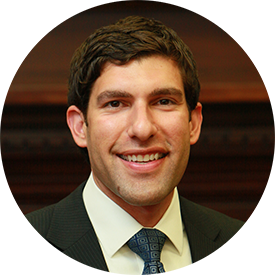Personal Wealth Management / Behavioral Finance
Data Idolatry
Most of the struggle of investing is the struggle to surmount the natural workings of the brain.
Most of the struggle of investing is the struggle to surmount the natural workings of the brain. Ruled by arcane, often deleterious systems of instinct evolved from ages long before civilization, our brains seem to do all they can to separate us from success. Nowhere is that more obvious than in investing, where human instincts of fear, poor long term memory, overconfidence, and many others work to defeat us, not to help us. Successful investing is all about surmounting your brain.
One of the main problems our brains challenge us with is subjectivity. That's not a topic often thrown around in investing, or even your casual dinner conversation. Subjectivity is usually the territory of philosophers and pseudo-intellectuals from Berkeley.
But subjectivity is an imperative concept to understand if you want to invest well. Subjectivity is the idea that you can only see things from your point of view, with your own personal biases and ego. There's no other way you can see things except through yourself. That's a problem because we know biases and emotions can sabotage our thinking and lead us to act wrongly. We cannot escape our brains. Well, there might be one way…
"The cause and root of nearly all evils in the sciences is this — that while we falsely admire and extol the powers of the human mind we neglect to seek for its true helps."
- Sir Francis Bacon
The Novum Organum ("The New Instrument") was written by Francis Bacon in 1620 and ushered in a new era of reasoning to the world. Many considered Bacon a philosopher, but he didn't propose a new philosophy, rather, a new method of thinking. He deemphasized human intuition and feelings in the quest for knowledge, asserting that one should proceed through inductive reasoning from facts.
Before beginning, the thinker must free the mind from certain false notions or tendencies which distort the truth. These are called "Idols." Bacon named four types of Idols, or biases, a person can have:
• Idols of the Tribe: These are biases all people have. Natural, inborn instincts.
• Idols of the Den: These are beliefs a person comes to believe on their own through subjective experience.
• Idols of the Marketplace: These are biases that stem from the misuse and misunderstanding of language and other forms of communication. (Think about it, we misunderstand each other through email and speech multiple times a day!)
• Idols of the Theatre: These result from an abuse of authority where people are led to believe dictums of the state by virtue of authority, not facts.
Perhaps you think you're immune to these, but you'd be wrong. We all suffer from such biases. How can we fix it? From Bacon's ideas followed the scientific method, a process which forces our subjectivity (mostly) out, and functions only with clear, objective, facts.
"Men have sought to make a world from their own conception and to draw from their own minds all the material which they employed, but if, instead of doing so, they had consulted experience and observation, they would have the facts and not opinions to reason about, and might have ultimately arrived at the knowledge of the laws which govern the material world."
- Sir Francis Bacon
Scientific method is, by far, the best human technique for acquiring new knowledge, as well as for correcting and integrating previous knowledge. It is based on gathering observable, empirical, measurable evidence. In short, it destroys subjectivity and biases.
• Observation: All data must be based on verifiable and observed facts. No assumptions.
• Prediction and Hypotheses: Information used must be valid and consistent for observations past, present, and future. That is, anomalies in data need to be identified and everything should be "apples to apples" so that it can be compared.
• Control: Actively and fairly sampling the range of possible occurrences, whenever possible and proper, as opposed to the passive acceptance of "opportunistic data," is the best way to counterbalance the risk of empirical bias.
• Falsifiability: This is the key. This is a gradual process that requires repeated experiments. One must be able to replicate results in order to corroborate them. This means that all hypotheses and theories are in principle subject to disproof.
• Identification of Causes: Identification of the causes of a particular phenomenon to the best achievable extent. The causes must correlate directly with observed effects.
For any high school grad this may seem simple, even trite. But most fully grown adults succumb more often to their "idols" than to the scientific method. That's because our idols are innate, but science requires discipline and isn't natural.
Even fewer think through to apply science to investing. From this simple framework an investor can obliterate false notions and see through common fears and widely held (but wrong beliefs). To be a successful investor, one must be a scientist, not an idol worshiper.
If you would like to contact the editors responsible for this article, please message MarketMinder directly.
*The content contained in this article represents only the opinions and viewpoints of the Fisher Investments editorial staff.
Get a weekly roundup of our market insights
Sign up for our weekly e-mail newsletter.

You Imagine Your Future. We Help You Get There.
Are you ready to start your journey to a better financial future?

Where Might the Market Go Next?
Confidently tackle the market’s ups and downs with independent research and analysis that tells you where we think stocks are headed—and why.





